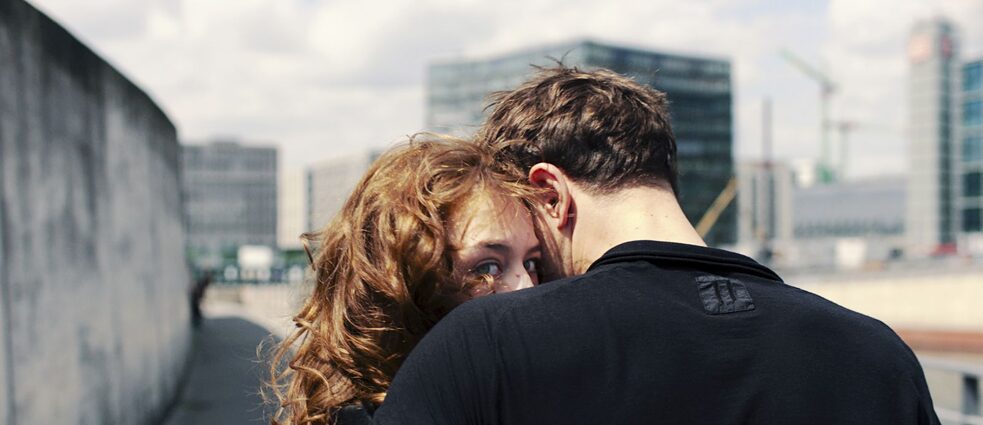Berlinale favourite
Petzold’s alluring fairytale "Undine" makes its mark

The director of Transit Christian Petzold returns with a film about an art historian who has a passionate affair with a diver. Paula Beer's performance in the lead role saw her win the Silver Bear for Best Actress at the Berlinale.
By Sarah Ward
Few filmmakers gaze at a woman in love in the same way as Christian Petzold. To be fair, few filmmakers continually place women in love in such prime positions as the German auteur. Including Barbara, Phoenix and Transit, his female-centric catalogue has stared at many an infatuated leading lady. Romance never defines his characters’ lives, but his protagonists all wear love’s scars. And so it’s fitting that in Undine, Petzold’s modernisation of the romantic German myth of the same name, the writer/director begins by peering deeply at his besotted heroine (Paula Beer). It’s just as apt that, as the movie stares at her, she looks on at her beloved.
Sat at a cafe opposite the Berlin City Museum, this isn’t a blissful moment. Minutes before Undine is due across the road, where she works as a historian giving talks about the city’s past, Johannes (Jacob Matschenz) reveals that he’s leaving her. And so, her lovelorn gaze is one of heartbreak rather than passion. She cries. She pleas. She glares, too, the camera rarely daring to leave her face. Then, Undine reminds Johannes that if he breaks up with her, she will have to kill him.
Updating a 19th-Century story
For those unacquainted with Petzold’s inspiration — a 19th-century story about a water sprite given human form through love, but destined to kill her beloved if he ever betrays her — this proclamation might seem drastic. But that’s how the fairy tale goes, although Petzold has more in store for his updated protagonist. A mere half-hour later, back at the same bar, Undine crosses paths with industrial diver Christoph (Franz Rogowski). He just listened to her tour, then followed her, sparking a meet-cute in front of a shattering fish tank. Soaked and laying on the floor, locking eyes and smiling, Undine suddenly has a new paramour. Paula Beer also starred in the 2018 Christian Petzold film "Transit"
| Marco Kruger / Schramm Film
As engagingly conveyed by Transit co-stars Beer and Rogowski, Undine and Christoph’s romance swiftly blossoms. He takes her diving, while she practices her lectures on his eager ears. Of course, Undine finds its dramatic tension in the clash between this happy union and the knowledge that Undine’s words to Johannes may still ring true. That’s Petzold’s addition to the narrative — and it couldn’t be more crucial. Undine isn’t simply a woman scorned, but a woman allowed to love again. In typical Petzoldian fashion, though, her past isn’t easily shaken.
Paula Beer also starred in the 2018 Christian Petzold film "Transit"
| Marco Kruger / Schramm Film
As engagingly conveyed by Transit co-stars Beer and Rogowski, Undine and Christoph’s romance swiftly blossoms. He takes her diving, while she practices her lectures on his eager ears. Of course, Undine finds its dramatic tension in the clash between this happy union and the knowledge that Undine’s words to Johannes may still ring true. That’s Petzold’s addition to the narrative — and it couldn’t be more crucial. Undine isn’t simply a woman scorned, but a woman allowed to love again. In typical Petzoldian fashion, though, her past isn’t easily shaken.
The past and the present
Petzold doesn’t toy his time period, as he did with Transit. Setting Undine in Berlin and tasking its characters with speaking about the city’s origins has a similar effect, however. In his meticulously shot frames, the ever-probing filmmaker continues to question history’s hold on the present. “Progress is impossible,” Undine exclaims during one of her talks.It’s a bleak comment but, as the feature unfurls her story, it leans heavily on that statement. Undine does so with a dash of the otherworldly mixed in with its fated romance, but this is Petzold’s alluring, entrancing yet sober-minded fairy tale. In other words, it’s exactly the film the writer/director was always going to make when he took on this story.